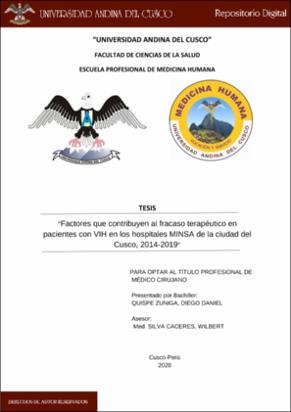| dc.contributor.advisor | Silva Cáceres, Wilbert | |
| dc.contributor.author | Quispe Zuniga, Diego Daniel | |
| dc.date.accessioned | 2020-11-18T17:26:21Z | |
| dc.date.available | 2020-11-18T17:26:21Z | |
| dc.date.issued | 2020-05-19 | |
| dc.identifier.uri | https://hdl.handle.net/20.500.12557/3477 | |
| dc.description.abstract | Antecedentes: El VIH sigue siendo una de la enfermedad infecciosa más perjudiciales
para la salud pública. A nivel del Perú según el MINSA en su notificación para el 2019 se
ha notificado un total de 120.389 casos de infección por VIH, de los cuales 43.072 (27%)
se encuentran en estadío SIDA. Muchos pacientes hacen fracaso terapéutico, el cual se
da cuando la terapia no responde a lo esperado. Una de las principales causas para hacer
fracaso terapéutico es la no adherencia al tratamiento, habiendo otros factores del
paciente tanto personales, sociales y médicos que contribuyen al fracaso terapéutico.
Métodos: Estudio descriptivo, observacional, transversal, retrospectivo. El muestreo fue
por conveniencia, 43 pacientes con fracaso terapéutico que se encuentran registrados un
padrón, que cumplan los criterios de inclusión y exclusión. Para el análisis de datos
estadísticos se utilizó SPSS v 25, la elaboración de gráficos se utilizó Excel Windows
2013. Resultados: Factores que más influyen al fracaso terapéutico son: La edad (20-49
años), varones (72%), homosexualidad (28%), solteros (76.7%), bajo nivel de instrucción
(86%), baja adherencia (88.4%), enfermedad avanzada al diagnóstico (53.5%), trastornos
psiquiátricos (79.1%), cambios en el esquema TARV (86%). Conclusiones: Se confirma
la importancia de la adherencia al tratamiento, educar a los pacientes y evitar trastornos
psiquiátricos; así evitar el fracaso terapéutico. | es_PE |
| dc.description.abstract | Background: HIV remains an infectious disease most damaging to public health.
At the level of Peru, according to the MINSA, in its notification for 2019, a total of
120,389 cases of HIV infection were reported, of which 44,072 (27%) were found
in the AIDS state. Many patients make therapeutic failure, which occurs when the
therapy does not respond to what was expected. One of the main causes for
treatment failure is non-adherence to treatment, with other factors of the patient,
both personal, social and medical, that are successful in treatment failure.
Methods: Descriptive, observational, cross-sectional, retrospective study. The
sampling was for convenience, 43 patients with therapeutic failure who are
registered in a registry, who meet the inclusion and exclusion criteria. For the
analysis of statistical data, SPSS v 25 were found, the graphing was selected Excel
Windows 2013. Results: Factors that most influence therapeutic failure are: Age
(20-49 years), men (72%), homosexuality (28%), singles (76.7%), low level of
education (86%), low adherence (88.4%), advanced disease at diagnosis (53.5%),
psychiatric disorders (79.1%), changes in the ART scheme (86%). Conclusions:
The importance of adherence to treatment, educating patients and avoiding
psychiatric disorders was confirmed; thus avoiding therapeutic failure. | en_US |
| dc.description.uri | Tesis | es_PE |
| dc.format | application/pdf | es_PE |
| dc.language.iso | spa | es_PE |
| dc.publisher | Universidad Andina del Cusco | es_PE |
| dc.rights | info:eu-repo/semantics/restrictedAccess | es_PE |
| dc.source | Universidad Andina del Cusco | es_PE |
| dc.source | Repositorio Institucional UAC | es_PE |
| dc.subject | Terapia | es_PE |
| dc.subject | VIH | es_PE |
| dc.subject | Infección | es_PE |
| dc.subject | Enfermedad avanzada | es_PE |
| dc.title | Factores que contribuyen al fracaso terapéutico en pacientes con VIH en los hospitales MINSA de la ciudad del Cusco, 2014-2019 | es_PE |
| dc.type | info:eu-repo/semantics/bachelorThesis | es_PE |
| thesis.degree.name | Médico Cirujano | es_PE |
| thesis.degree.grantor | Universidad Andina del Cusco. Facultad de Ciencias de la Salud | es_PE |
| thesis.degree.level | Titulo Profesional | es_PE |
| thesis.degree.discipline | Medicina Humana | es_PE |

